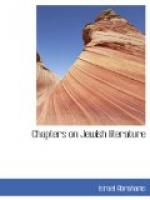JACOB ASHERI.
Graetz.—IV, p. 88 [95].
SOLOMON BEN ADERETH.
Graetz.—III, p. 618 [639].
MEIR OF ROTHENBURG.
Graetz.—III, pp. 625, 638 [646].
JUDAH MINZ.
Graetz.—IV, p. 294 [317].
MAHARIL.
S. Schechter.—Studies in Judaism, p. 142 [173].
DAVID BEN ABI ZIMRA.
Graetz.—IV, p. 393 [420].
JAIR CHAYIM BACHARACH.
D. Kaufmann, J.Q.R., III, p. 292, etc.
JOSEPH KARO.
Graetz.—IV, p. 537 [571].
MOSES ISSERLES.
Graetz.—IV, p. 637 [677].
CHIDDUSHIM.
Graetz.—IV, p. 641 [682].
CHAPTER XXIV
AMSTERDAM IN THE SEVENTEENTH CENTURY
Manasseh ben Israel.—Baruch
Spinoza.—The Drama in
Hebrew.—Moses
Zacut, Joseph Felix Penso, Moses Chayim
Luzzatto.
Holland was the centre of Jewish hope in the seventeenth century, and among its tolerant and cultivated people the Marranos, exiled from Spain and Portugal, founded a new Jerusalem. Two writers of Marrano origin, wide as the poles asunder in gifts of mind and character, represented two aspects of the aspiration of the Jews towards a place in the wider world. Manasseh ben Israel (1604-1657) was an enthusiast who based his ambitious hopes on the Messianic prophecies; Baruch Spinoza (1632-1677) lacked enthusiasm, had little belief in the verbal promises of Scripture, yet developed a system of ethics in which God filled the world. Manasseh ben Israel regained for the Jews admission to England; Spinoza reclaimed the right of a Jew to a voice in the philosophy of the world. Both were political thinkers who maintained the full rights of the individual conscience, and though the arguments used vary considerably, yet Manasseh ben Israel’s splendid Vindiciae Judeorum and Spinoza’s “Tractate” alike insist on the natural right of men to think freely. They anticipated some of the greatest principles that won acceptance at the end of the eighteenth century.
Manasseh ben Israel was born in Lisbon of Marrano parents, who emigrated to Amsterdam a few years after their son’s birth. He displayed a youthful talent for oratory, and was a noted preacher in his teens. He started the first Hebrew printing-press established in Amsterdam, and from it issued many works still remarkable for the excellence of their type and general workmanship. Manasseh was himself, not only a distinguished linguist, but a popularizer of linguistic studies. He wrote well in Hebrew, Latin, English, Spanish, and Portuguese, and was the means of instructing many famous Christians of the day in Hebrew and Rabbinic. Among his personal friends were Vossius, who translated Manasseh’s “Conciliator” from Spanish into Latin. This, the most important of Manasseh’s early writings, was as popular with Christians as with Jews, for it attempted to reconcile the discrepancies and contradictions apparent in the Bible. Another of his friends was the painter Rembrandt, who, in 1636, etched the portrait of Manasseh. Huet and Grotius were also among the friends and disciples who gathered round the Amsterdam Rabbi.




